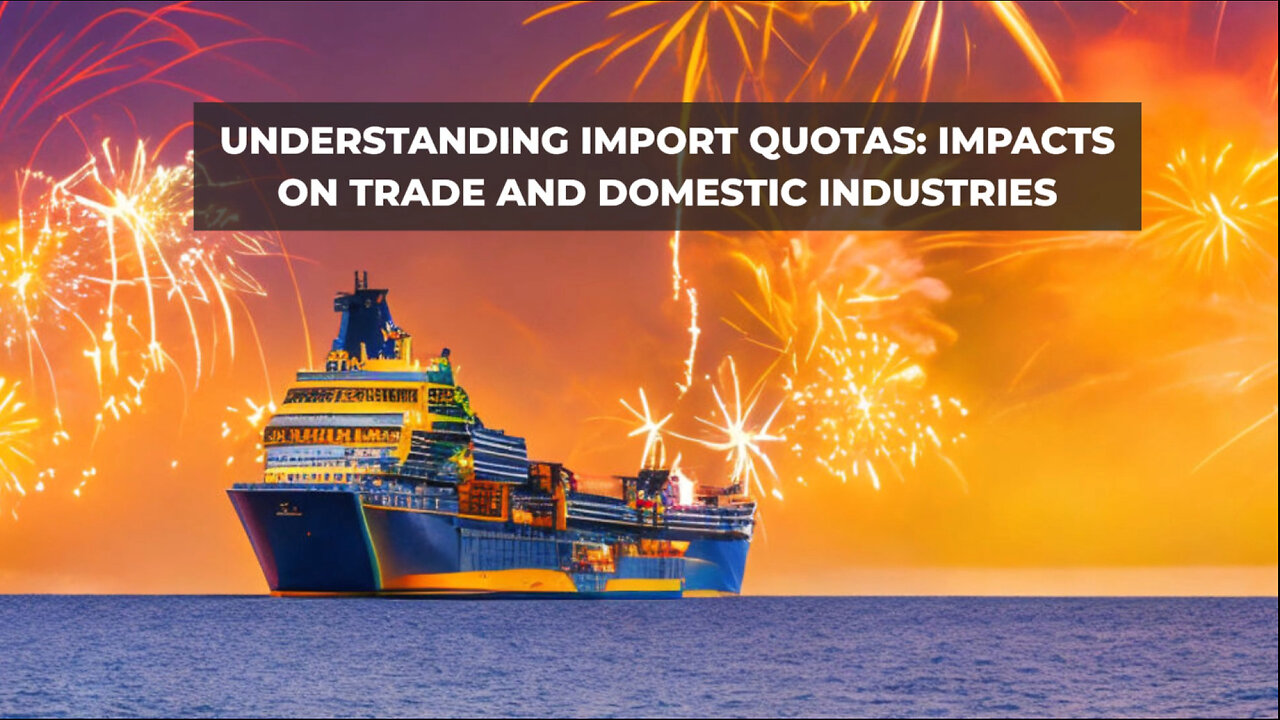Premium Only Content

Understanding Import Quotas: Protecting Industries or Limiting Choices?
License To Import // 323-578-6432 // [email protected] // www.licensetoimport.com
Import quotas are a key instrument used by governments to control and regulate international trade. They refer to limits placed on the quantity or value of certain goods that can be imported into a country during a specified period. Import quotas are implemented for various reasons, including protecting domestic industries, maintaining national security, correcting trade imbalances, and addressing environmental or health concerns.
The primary objective of imposing import quotas is to protect domestic industries from intense foreign competition. By limiting imports, domestic producers have a better chance to compete in the domestic market. Additionally, import quotas can be imposed on goods critical for a nation's security to reduce dependence on other countries. They can also help address trade deficits by restricting imports and protecting domestic industries. Furthermore, import quotas may be utilized to regulate the importation of goods that pose environmental or health risks, ensuring compliance with standards and regulations.
The impacts of import quotas are wide-ranging. Firstly, they can lead to higher prices for consumers due to reduced competition and the dominance of domestic producers. Secondly, import quotas offer protection to domestic industries, allowing them to expand their market share and increase profitability. However, they can also create trade tensions and disputes between countries, especially if they are perceived as unfair or overly restrictive. Moreover, import quotas can limit the variety of available products and possibly lead to lower product quality.
It is important to strike a balance between protecting domestic industries and maintaining healthy global trade relationships. Governments must carefully consider the potential consequences of implementing import quotas and seek to address trade imbalances and protect domestic industries while minimizing negative impacts on consumers and international trade relationships. By doing so, they can ensure a fair and efficient customs brokerage process that supports domestic industries and promotes global trade.
#usimportbond #isfcustomsbroker #uscustomsclearing #isfentry
Video Disclaimer Here: This video is solely for education and is not endorsed by any US government agency.
-
 1:40
1:40
License To Import
2 months agoHow To File ISF For Zentai / Catsuit
102 -
 24:41
24:41
marcushouse
17 hours ago $4.24 earnedStarship’s Final Moment Before Everything Changes! 🚀
15.4K10 -
 LIVE
LIVE
BlackDiamondGunsandGear
5 hours agoAFTER HOURS ARMORY / EDC / Daily / Truck / SHTF
161 watching -
 2:12:59
2:12:59
Tundra Tactical
4 hours ago $3.22 earnedCZ/Colt Canada Destroys Privately Owned Firearms After Canada Gun Ban
17.5K -
 58:02
58:02
ChopstickTravel
1 month ago $2.50 earnedBillionaire Food in Dubai 🇦🇪 Super Luxury MICHELIN +WAGYU + CAVIAR in UAE!
39.1K2 -
 LIVE
LIVE
DLDAfterDark
4 hours ago $0.95 earnedWhat Are The Best Tools For Personal, Home, and Vehicle Defense? After Hours Armory
378 watching -
 2:58
2:58
From Zero → Viral with AI
21 hours ago $0.57 earnedAI Isn’t Ruining Politics — It’s Revealing the Truth.
10.1K2 -
 LIVE
LIVE
MattMorseTV
5 hours ago $50.78 earned🔴Portland Antifa's LASER ATTACK.🔴
3,947 watching -
 2:57:37
2:57:37
megimu32
4 hours agoOFF THE SUBJECT: SAVAGE SATURDAY | Bodycam Chaos & Fortnite Madness!
24.8K4 -
 3:37:17
3:37:17
Mally_Mouse
1 day ago🌶️ 🥵Spicy BITE Saturday!! 🥵🌶️- Let's Play: Content Warning
33.7K2